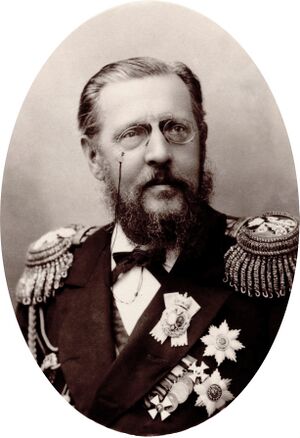Dmitry Bortnyansky and Grand Duke Konstantin Nikolayevich: Difference between pages
No edit summary |
No edit summary |
||
| Line 1: | Line 1: | ||
{{picture|file= | {{picture|file=Konstantin Nikolayevich.jpg|caption='''Grand Duke Konstantin Nikolayevich''' (1827-1892)}} | ||
Russian | Russian Grand Duke (b. 9/21 September 1827 in [[Saint Petersburg]]; d. 13/25 January 1892 in [[Pavlovsk]]), born '''''Konstantin Nikolayevich Romanov''''' (Константин Николаевич Романов); also known as '''''Grand Duke Constantine Nikolayevich'''''. | ||
During the reign of his brother [[Alexander II]] (1818–1881), Konstantin was an admiral of the Russian fleet and reformed the Russian Navy. He was also an instrumental figure in the emancipation of the serfs. He was less fortunate as viceroy of Poland and had to be recalled to Russia where he was attacked for his liberalism. | |||
From 1865 to 1881 he was President of the State Council. However, after the assassination of his brother [[Alexander II]] in 1881, the Grand Duke fell from favour under the reign of the new emperor, his nephew [[Alexander III]], who opposed Konstantin's liberal ideas and gradually stripped him of all his governmental positions. His retirement was marked with personal turmoil and family setbacks. After suffering a stroke, he spent his last years as an invalid. | |||
== | ==Tchaikovsky and Grand Duke Konstantin Nikolayevich== | ||
* | Konstantin had a great appreciation for the arts, and enjoyed drawing and music, learning to play the piano and cello. In 1873 he succeeded the [[Grand Duchess Yelena Pavlovna]] (1807–1873) as President of the Imperial Russian Musical Society. After meeting the Grand Duke at a reception in May that year, Tchaikovsky reported that "he was extremely friendly with me, full of enthusiasm for my symphony, and paid me many compliments" <ref name="note1"/>. | ||
* | |||
In 1848 Konstantin married Princess Alexandra Friederike Henriette of Saxe-Altenburg (1830–1911), who assumed the title Grand Duchess Aleksandra Iosifovna. They had six children, one of whom — [[Grand Duke Konstantin Konstantinovich]] (1858–1915) — became a regular correspondent with Tchaikovsky. | |||
==Dedications== | |||
Tchaikovsky dedicated two of his works to the Grand Duke: | |||
* ''[[The Oprichnik]]'', opera in four acts (1870–72) | |||
* [[String Quartet No. 2]] in F major, Op. 22 (1874) | |||
==External Links== | ==External Links== | ||
* [[wikipedia: | * [[wikipedia:Grand Duke Konstantin Nikolayevich of Russia|Wikipedia]] | ||
* {{ | * {{viaf|175748982}} | ||
* {{ | |||
==Bibliography== | |||
* {{bib|2013/19}} (2013) | |||
* {{bib|2015/10}} (2015) | |||
==Notes and References== | ==Notes and References== | ||
<references> | <references> | ||
<ref name="note1">[[Letter | <ref name="note1">[[Letter 312]] to [[Ilya Tchaikovsky]], 24 May/5 June 1873. The symphony in question was the [[Symphony No. 2]], which had recently received its first performance.</ref> | ||
</references> | </references> | ||
[[Category:People| | [[Category:People|Konstantin Nikolayevich]] | ||
[[Category: | [[Category:Dedicatees|Konstantin Nikolayevich]] | ||
[[Category: | [[Category:Nobility|Konstantin Nikolayevich]] | ||
__NOTOC__ | |||
Revision as of 15:27, 27 August 2023
Russian Grand Duke (b. 9/21 September 1827 in Saint Petersburg; d. 13/25 January 1892 in Pavlovsk), born Konstantin Nikolayevich Romanov (Константин Николаевич Романов); also known as Grand Duke Constantine Nikolayevich.
During the reign of his brother Alexander II (1818–1881), Konstantin was an admiral of the Russian fleet and reformed the Russian Navy. He was also an instrumental figure in the emancipation of the serfs. He was less fortunate as viceroy of Poland and had to be recalled to Russia where he was attacked for his liberalism.
From 1865 to 1881 he was President of the State Council. However, after the assassination of his brother Alexander II in 1881, the Grand Duke fell from favour under the reign of the new emperor, his nephew Alexander III, who opposed Konstantin's liberal ideas and gradually stripped him of all his governmental positions. His retirement was marked with personal turmoil and family setbacks. After suffering a stroke, he spent his last years as an invalid.
Tchaikovsky and Grand Duke Konstantin Nikolayevich
Konstantin had a great appreciation for the arts, and enjoyed drawing and music, learning to play the piano and cello. In 1873 he succeeded the Grand Duchess Yelena Pavlovna (1807–1873) as President of the Imperial Russian Musical Society. After meeting the Grand Duke at a reception in May that year, Tchaikovsky reported that "he was extremely friendly with me, full of enthusiasm for my symphony, and paid me many compliments" [1].
In 1848 Konstantin married Princess Alexandra Friederike Henriette of Saxe-Altenburg (1830–1911), who assumed the title Grand Duchess Aleksandra Iosifovna. They had six children, one of whom — Grand Duke Konstantin Konstantinovich (1858–1915) — became a regular correspondent with Tchaikovsky.
Dedications
Tchaikovsky dedicated two of his works to the Grand Duke:
- The Oprichnik, opera in four acts (1870–72)
- String Quartet No. 2 in F major, Op. 22 (1874)
External Links
Bibliography
- Чайковский и великий князь Константин Николаевич. К истории взаимоотношений (2013)
- P. I. Čajkovskij und der Großfürst Konstantin Nikolaevič Romanov. Zur Geschichte einer Wechselbeziehung (2015)
Notes and References
- ↑ Letter 312 to Ilya Tchaikovsky, 24 May/5 June 1873. The symphony in question was the Symphony No. 2, which had recently received its first performance.

